Sao Paulo to Paraty, Brasil
The only thing that eased the pain of having to pay to ride on potholed, single lane highways, was that the symbol for a motorbike on each of the toll booth price lists was an old Harley Davidson FXR.A couple of recovery days later, with our bags full of clean clothes, a fresh tub of Marmite, Jacquies favourite, and a few extra plastic bags full of herbs from Myles cabinet, we left our mates behind and made our way to Sao Paolo. We rode out of the city, and onto the highway. We passed through another bunch of tollbooths on this road. The only thing that eased the pain of having to pay to ride on potholed, single lane highways, was that the symbol for a motorbike on each of the toll booth price lists was an old Harley Davidson FXR.
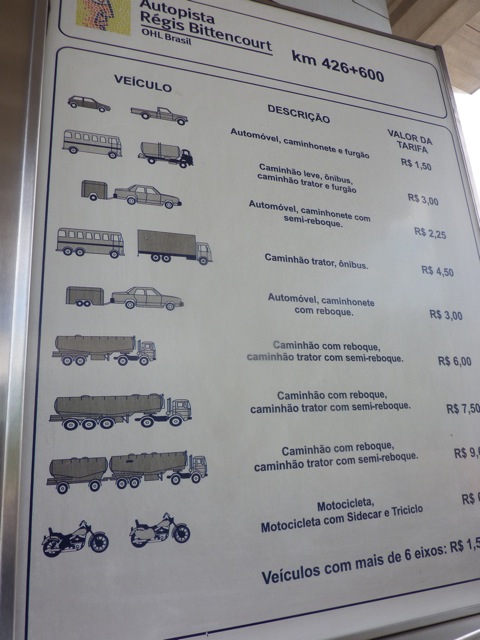
We rode all day, arriving at the outskirts of Sao Paolo just in time for rush hour-on Friday. In a city with over 11,000,000 residents, this is not the best time.
We joined the queue of traffic and hoped we were heading in the right direction. To make matters worse, the University teachers were staging a march through the city, and of course, they were marching on the same street that we were riding down.
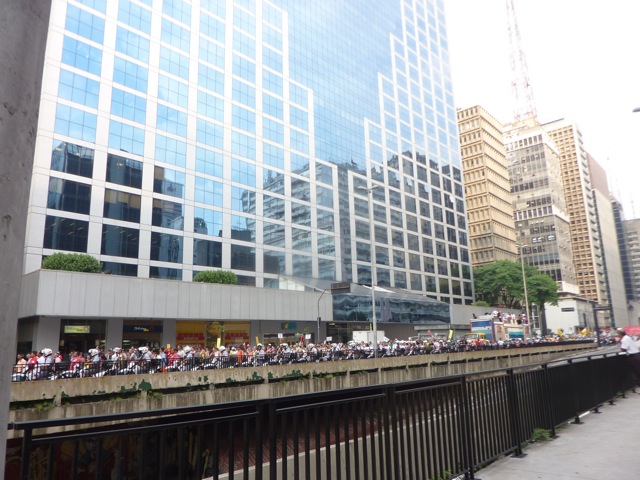
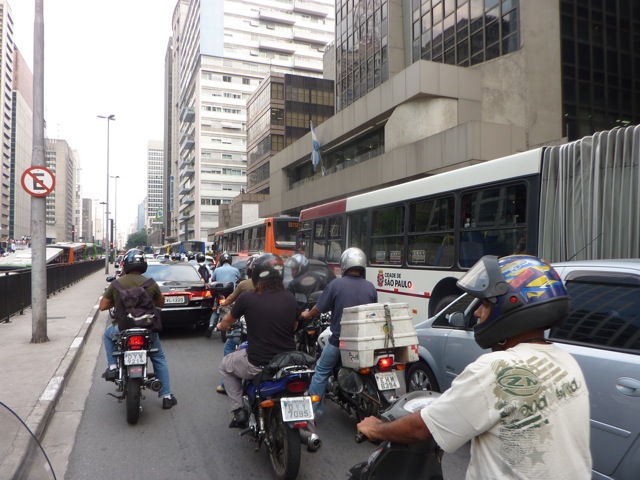
The 125cc couriers in Sao Paulo were without doubt, the most nihilistic, death defying lunatics I have ever seen!
We sat in the traffic, slowly melting in our riding gear, and making very little progress. Local couriers whizzed by us on their little 125s, going through gaps millimetres wider than their handlebars, and far too small for us. When we did manage to find a gap in a lane that could accommodate Garths girth, we were soon being honked and tooted at by the stream of smaller bikes we were holding up behind. I guided Garth as quickly as I could between the lines of stationary cars. The 125s were darting all around me like flies, in death defying feats of lunacy and daring. They threw their bikes about so wildly, it was a wonder they lived as long as they did. We had come across a couple of accidents where couriers had been knocked off their bikes. Luis and I helped a young guy who had been side swiped and knocked off his bike while undertaking a small truck. I was surprised at the time that it didnt happen more often. The couriers often wore their helmets resting on top of their head, and not pulled on or fastened. Packages were sometimes ridiculously large, balanced precariously on the postie bikes favoured by most of the couriers. We saw a rather portly gentleman wobbling along on his scooter with a huge sac of corn on his lap that was so wide, he could bet get his arms around it and on to the handlebars. Once he did manage to grab them, and twist the throttle, he had no way of steering the bike as the sack was wedged in behind the handlebars so that they could not be turned either way.
Come to think of it, you never really saw any old motorcycle couriers. You can draw your own conclusions from that!
We squeezed ourselves off the main avenue and wove our way through the smaller parallel streets, in the general direction of the marker on the GPS.
Eventually we rejoined the main avenue further on down the road, where the traffic was actually moving, and continued on to the hostel.
Sao Paolo really is a big city. A crowded metropolis, alive with street vendors, roadside markets, what I can only call traffic light entertainers.
First spotted in Chile, where a group of break-dancers in Antofagusta were putting on a show every time the lights changed, I generally enjoyed the art of the traffic light entertainers. I pulled up to the front of the queue where the group were dancing, and cranked up the music from Garths stereo. They loved it! Here in Sao Paolo there were jugglers, jugglers on stilts, one-legged jugglers, brother-sister jugglers, jugglers on unicycles; we had seen a whole range of street talent in Chile, cheer-leaders, mime artists, slap stick comics, the works, here in Sao Paulo, juggling was King, and Queen, Prince and royal corgi.
Sao Paolo, however, was merely a stop over on the way to Paraty, we were heading back to the beach, and werent much in the mood for a city. We had no interest in checking out the museums, nor the malls, nor the art galleries, we just wanted some sand and some sea. After getting sorted in the hostel, we went out in search of a bank that would accept our cards, not an easy task in Brazil, and took the opportunity to have a mooch around our immediate vicinity.
We didnt seem to be in a very lively area of the city. We walked around, but werent inspired to walk for long, so we picked up some Yaki Soba from a "Chinesa", cooking busily away at a wok in the street, and went back to the hostel.
We rode out the next morning, and Brazil revealed itself to us a little more. We headed out of the city and took the shortest route we could find to the coast.
We rode through lush green fields, rows and rows of coconut palms and tropical forests, up and over mountains, and then down the other side to be greeted with spectacular views of the unspoilt coastline below and the turquoise blue sea beyond.
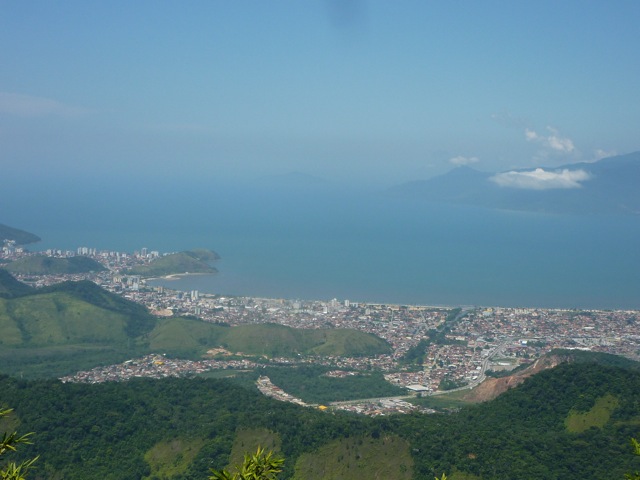
We followed the winding road down the mountain, and parked up on the first slice of beach we came across. We stopped next to a small beach bar and ordered sandwiches and fresh juice. We zipped ourselves out of our riding gear, and made ourselves comfortable in the plastic chairs in front of the beach bar, watching the waves rolling up and down the beach in front of us. This is what everyday should be like, I thought to myself. This ride was turning out to have all the requirements for a perfect ride.
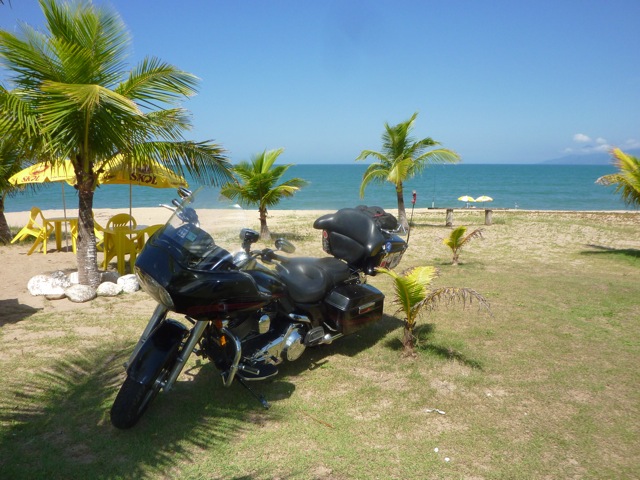
Garth takes a break by the beach under a palm tree, he loves to be beside the sea side
We had left early in the morning, barging our way out of a city that was just coming to life, had ridden for half a day and was now on the beach. The sun shone brightly, the air was fresh and invigorating, and breeze from the water cooled us.
We savoured the moment, sipping on our fresh pineapple juices on the beach with our mate Garth chilling out under the palms behind us. Perfect.
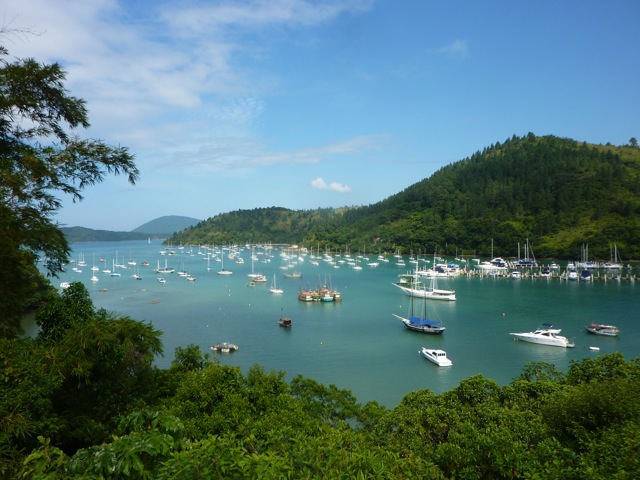
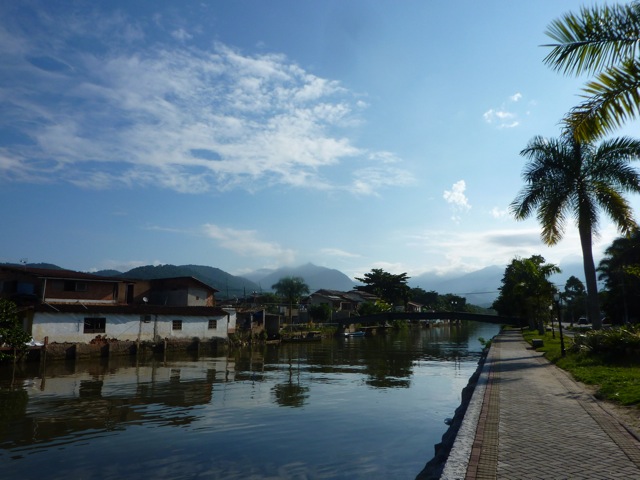
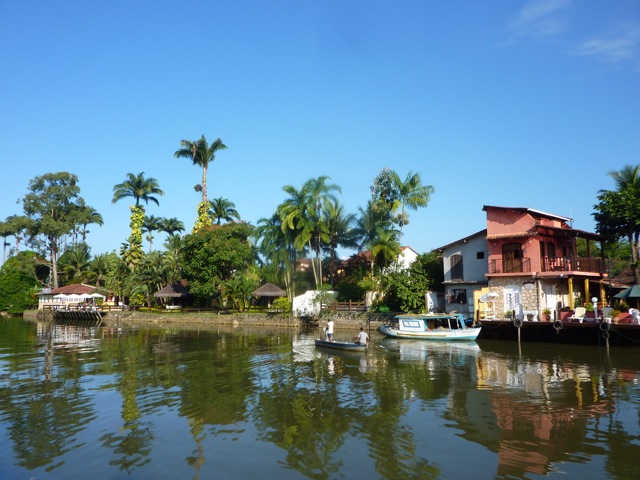
Getting lost in Paraty
We rode into Paraty in the middle of the afternoon, we got lost, then found our way again, and made it to the Blue Jungle hostel. Time for a quick dip in the pool. We didnt even check in, we just stripped off and dived in the water. The perfect ending to a perfect day. But the day wasnt yet over. The guests in the hostel included a young English couple, an Irishman, and Aussie and a Yank, and we quickly all became friends, thanks mainly to the efforts of the German owner, Phelia, and her boyfriend Fabio.
That night, we headed in to town with the other English couple. Paraty was our first colonial Portuguese town, and it was a gorgeous town. Quaint but deadly cobble stoned streets were home to numerous boutiques, bars and restaurants. We ate in a per kilo restaurant, where you pick your food from the buffet, weigh it, and pay for the weight of your meal, we found this was a great way to eat so long as you avoided the fluff. Pasta, chips, vegetables, and salads were unworthy; our plates were piled with meat.
We ate, drank and chatted and the strolled through the historic centre of the town. It really was a charming little place, just on the verge of becoming a tourist trap, but not quite there yet, thankfully.
We finished off our dinner with ice cream from the per kilo ice cream parlour, and Jacquie and I agreed that we had had as near as damn it a perfect day.
There were a couple of things worth seeing around Paraty, not surprisingly, the first place on my list was the local Cachaca distillery. Jacquie and I ate breakfast at the hostel, and together with Dan and Sarah, the other English couple staying at the hostel, we walked into town and got on the bus for Penha. We had a bumpy ride on the cramped local bus, and our route took us past several areas where the road was still half covered with earth from the recent mudslides.
We got off at the entrance to the falls, which were directly opposite the distillery, and decided we would check the distillery first, then go visit the falls.
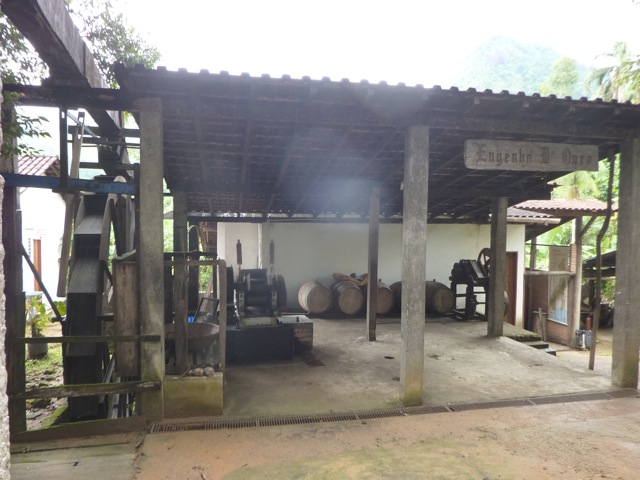
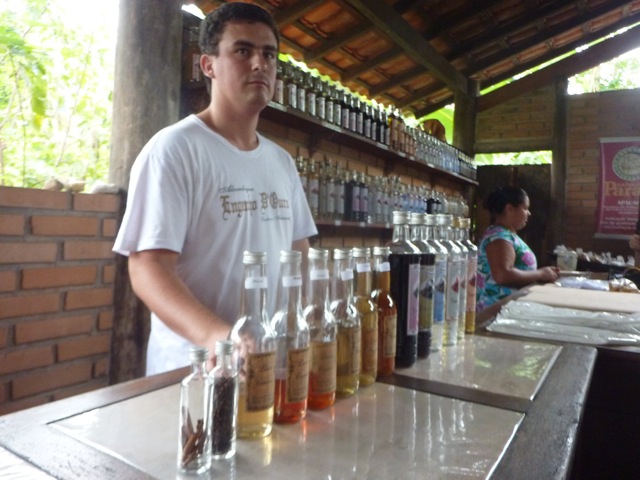
The Engenho DOuro distillery is a small family owned affair, which produces organic Cachaca from the same water that fills the waterfalls across the way. We met Jorge, who gave us a quick tour of the site and a brief explanation of the distilling process. After the tour, Jacquie, Sarah and Dan went over to the waterfalls, while I stayed a little longer with Jorge, who had invited me to taste some of the different types of Cachaca made at the site.
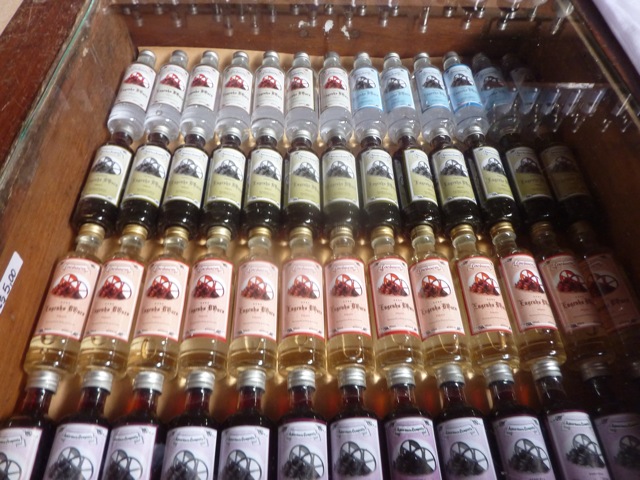
Some of the Cachacas from the Eugeio D'Ouro Distillery in Penha
We tasted aged, oak barrelled Cachaca, the regular silver Cachaca and a selection of delicious Cachaca liquors, honey, basil, strawberry, mint and orange were just a few that we tried. By the time the tasting was over, I was a little the worse for wear, it was, after all, barely past 11am. I walked over to the waterfalls and met up with the others, and joined them watching the locals sliding down the waterfall.
The water coursed over rock that had been so smoothed down that the locals had taken to using the falls as their own waterslide.
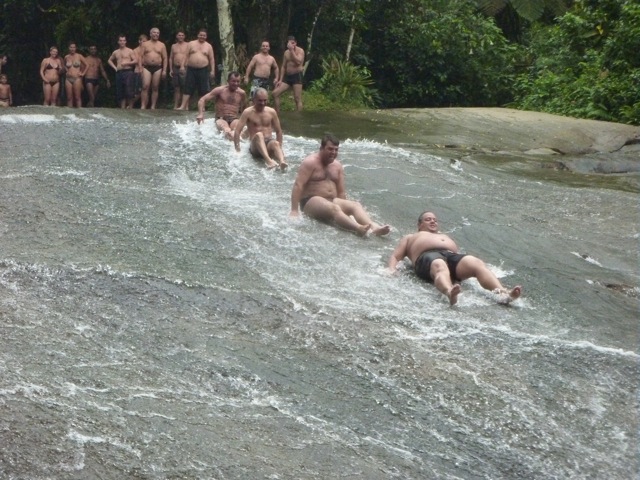
Locals enjoy the natural waterslide at Penha
The coolest of the locals had the perfected the art of descending the waterfalls whilst standing upright, barefoot skiing down the falls.
Dan went and had a go with the young guys from the village, whilst the rest of us walked up the side of the waterfall to the top where we sat in the pools above the cascades.
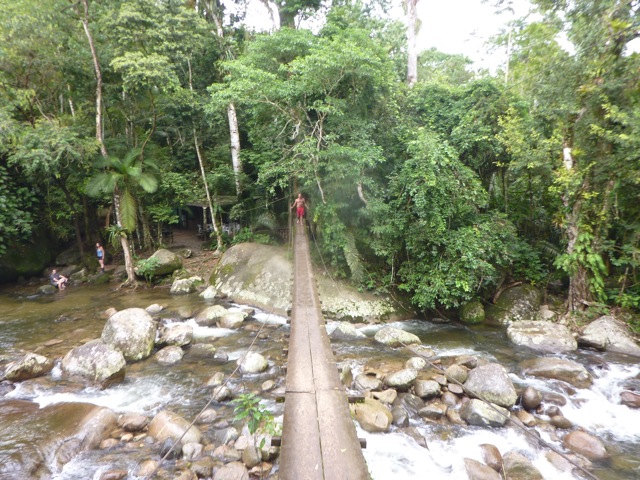
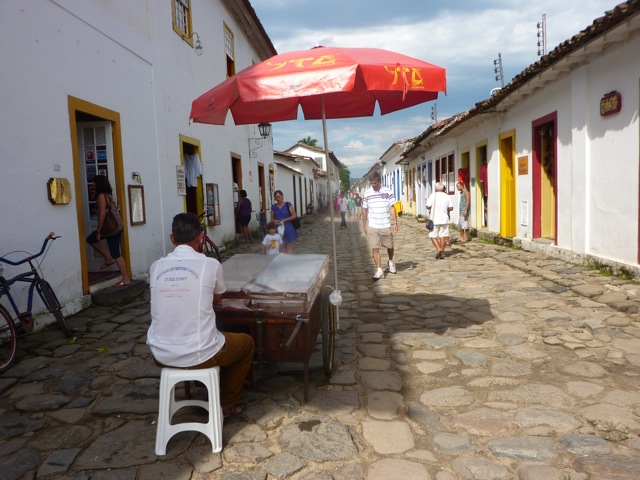
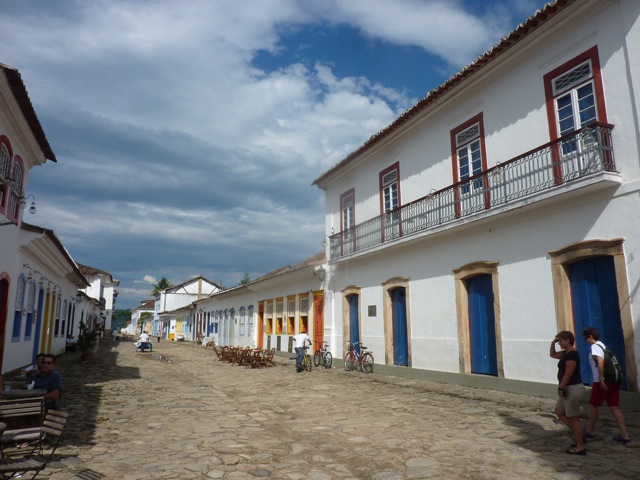
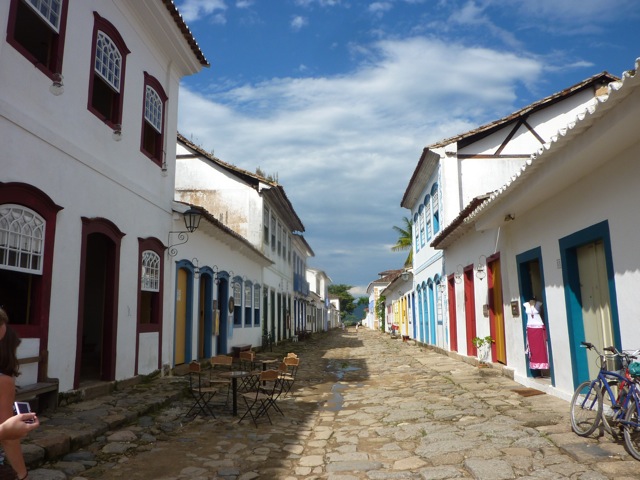
We took the bus back to Paraty, and the rest of the day was spent wondering the cobbled streets of Paraty.
Our next adventure in Paraty was the boat trip around the bay. We had been told that the trip from Paraty was one of the best boat trips in Brazil, so we decided to take another day off the bike and instead spend the day relaxing on the calm waters around Paraty.
Most of the hostel guests were going, so we all walked to the port together, picked a boat, haggled a price, boarded, and were on our way. The boat, no more than 20 ft long, was painted in the Brazilian colours, yellow and green, and had a small upper deck for the sunbathers.
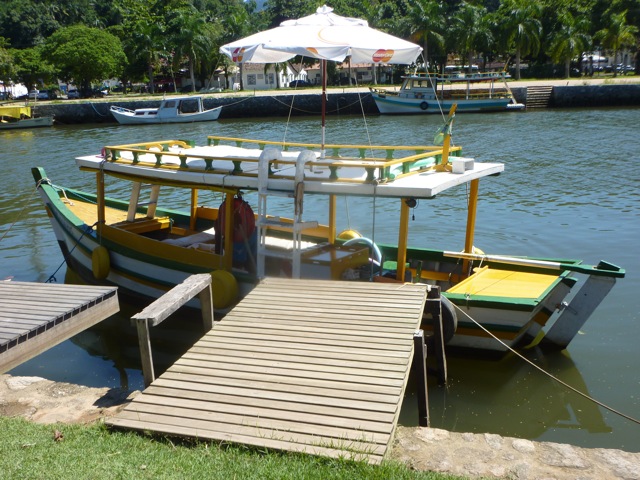
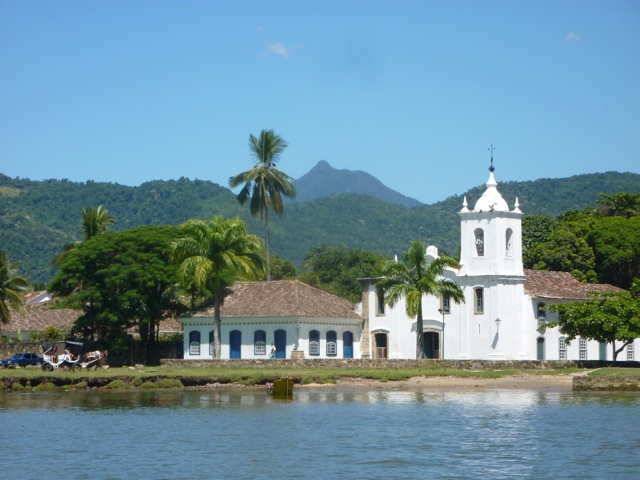
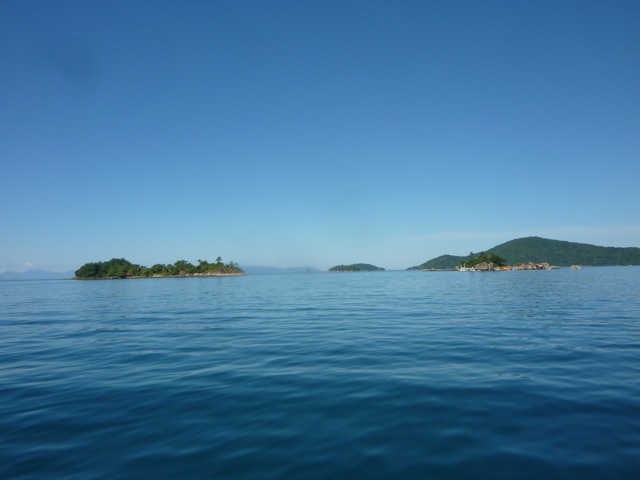
We motored out of the harbour, past a beautiful white washed colonial church, and out into the almost open water. The sea was dotted with little islands, some of them home to exclusive restaurants, others that were set up to host corporate and private functions, and others that were simply covered in trees. Stopped at a couple of the islands, once for some lunch on a deserted island, well, except for the restaurant and the coconut vendor, it was deserted, and we snorkelled above a reef just off the shore of another of the islands.
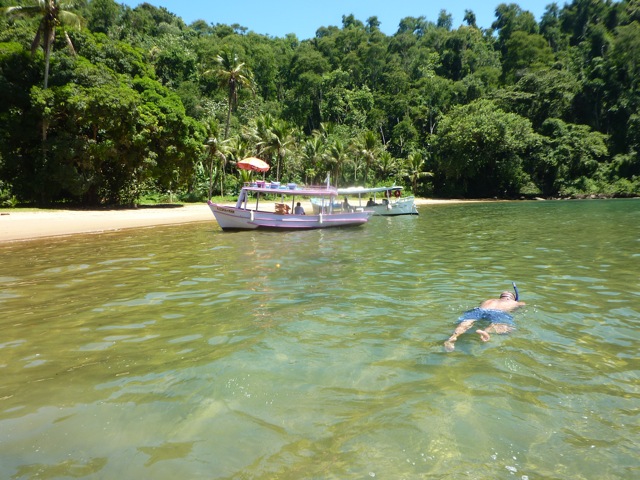
Another beautiful day, we were loving Brazil. The skipper took us boys to the shore where we climbed up and over some slippery rocks and followed a track through the jungle to where we were going to jump off a small rock and into the water beneath. Well the small rock was more like a mini cliff face. The skipper was first to jump, and he pulled off his back flip dive with suitable aplomb for an islander, followed by the rest of us in a much less graceful manner.
We returned to dry land just before sunset and strolled back through the town and to the hostel. We sat around a BBQ that night, enjoying the company of our fellow travellers and their tales. It made life so much easier when you met people of a similar mind set when travelling. We all sat around the big wooden table outside the hostel, listening to the sounds of the frogs and insects surrounding us, and laughed and joked with each other.
The days passed lazily in Paraty, we took another bus ride out to a beautiful nearby beach, which was spoilt only by the persistent sand flies. I had pretty much come to the conclusion that paradise didnt exist. There was always something amiss. Mosquitoes were a big problem; occasionally the wind kept them away, but this usually also meant one was likely to receive a proper sand blasting. There were of course other considerations. I had a mental list of requirements for my ideal beach, my Playa Nirvana, my Paradise.
It should be a sandy beach, fine, white sand. It should be accessible by paved road, and should not involve a hike.
There should be one, maybe two structures on the beach, providing fresh fruit juices, a small selection of cocktails-Mojitos, Pina Coladas and Caipirinhas-tasty snacks and fresh fish.
The water should be turquoise, clean and clear.
There should be a few people on the beach, not too many, but enough for a small amount of people watching.
The sun should be in an ideal position for sunbathing, and should be present from early morning until its sets behind the horizon, sinking into the sea.
There should be a gentle, cooling breeze.
There should be a complete absence of any sort of insect, flying or crawling.
There should be a small reef, providing an ideal opportunity for snorkelling.
Palm trees should line the beach, offering shade for the fairer skinned, and coconuts for the thirsty.
The occasional beach vendor wouldn't go amiss, so long as they were rare, and when they appeared, they would be fully stocked with all necessary beach goodies that we may have forgotten to pack, or run out of.
Not much to ask really, but after visiting beaches on both the Pacific and Atlantic sides, including a small selection of the Caribbean, I was still searching.
Mexico had some idyllic beaches around Puerto Escondido and Zipolite, but they were over populated, and the waves so high, and the rip so fierce, that we were prevented from going into the water. El Salvador and Nicaragua both had beautiful black sand beaches, and I think Nicaragua was the closest I came to an ideal beach, at Maderas, however the beach was too hard to get to and offered but one choice of accommodation, which was less than basic.
Beach wise, Brazil was shaping up nicely. A good deal of the beaches were home to apartments and condos for the rich and retired, and even though the `Brazilian government had a policy of keeping all beaches public, the beaches in front of the condos were only reachable by boat, unless you were a resident and could gain access through the gated and guarded entrance.
